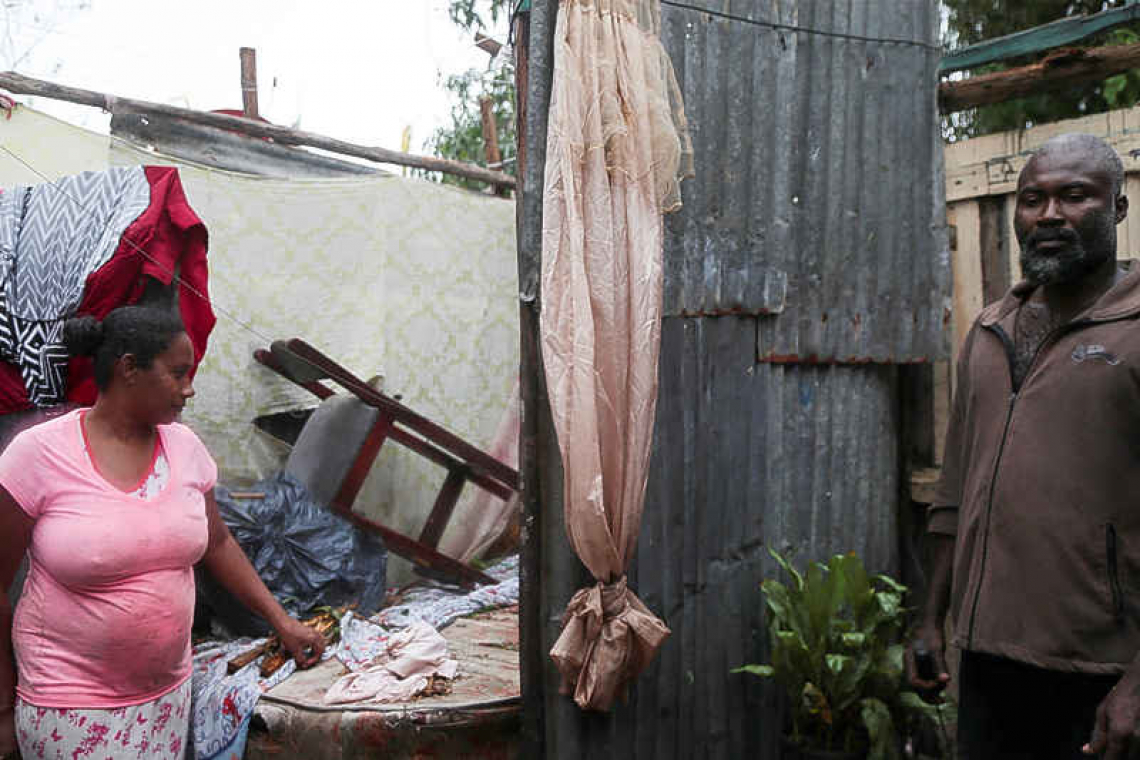A man and a woman stand inside their destroyed house in the aftermath of Hurricane Fiona in Higuey, Dominican Republic, September 19, 2022.
SAN JUAN, Puerto Rico/DOMINICAN REPUBLIC, Santo Domingo--Hurricane Fiona was churning north on Monday evening after bringing torrential rain and powerful winds to the Dominican Republic and triggering a total power outage in neighbouring Puerto Rico, where at least two people died.
The category two hurricane will likely become a category three as it moves across warm Caribbean waters toward the Turks and Caicos. Fiona was upgraded to a category two with winds of 105 mph (169 kph) by the National Hurricane Center on Monday evening.
On Tuesday, the centre of Fiona is expected to pass near or to the east of the archipelago, which is subject to a current hurricane warning, the United States (US) National Hurricane Center (NHC) said. Tropical storm conditions were also expected in the Bahamas.
After strafing Puerto Rico, Fiona made landfall in the Dominican Republic near Boca Yuma at 3:30am local time, according to the NHC. The centre of the storm reached the northern coast of Hispaniola before noon.
It is the first hurricane to score a direct hit on the Dominican Republic since Jeanne left severe damage in the east of the country in September 2018.
Fiona caused severe flooding, leaving several villages isolated, and some 800 evacuees and more than 11,000 people without power in the eastern region of the country.
“The damage is considerable,” said Dominican Republic President Luis Abinader. He plans to declare a state of disaster in the provinces of La Altagracia, where the famed resort of Punta Cana is located, El Seibo and Hato Mayor.
In La Altagracia, in the extreme east of the country and where the hurricane made landfall Monday morning, the overflow of the Yuma River damaged agricultural areas and left several towns isolated. Electric and water utilities are working to restore services in affected areas.
In Puerto Rico, a territory of the United States, residents were still facing strong winds, frequent lightning and heavy rain. Fiona made landfall there on Sunday afternoon, dumping up to 30 inches (76.2 cm) of rain in some areas.
The storm comes five years after Puerto Rico was ravaged by Hurricane Maria, which triggered the worst power blackout in U.S. history.
US President Joe Biden spoke with Puerto Rico Governor Pedro Pierluisi on Monday, promising to increase the support personnel sent to the island over the next few days.
“The president said that he will ensure that the Federal team remains on the job to get it done,” according to the White House.
Federal Emergency Management Agency (FEMA) Administrator Deanne Criswell will travel there on Tuesday.
Jeannette Rivera (54) a public relations worker in Orlando, Florida, said she had not spoken with her family since a spotty phone call early Sunday. She fears for her parents’ safety and the health of her 84-year-old father, who had just contracted coronavirus COVID-19 and was running a fever. “My worry is that if they need help, there is no way to communicate,” Rivera said.
Without power
Nearly 90% of Puerto Rico remained without power on Monday, according to Poweroutage.us. Officials said it would take days to reconnect the whole island of 3.3 million people.
Many roads were left impassable due to downed trees and mudslides. Images on social media depicted submerged cars, people wading in waist-deep water and rescue boats floating down swamped streets. Just 30% of drinking water customers have service.
Crews rescued some 400 people from flooding in Salinas, a town in the south where rain has turned to a drizzle. The south and southeast regions were the hardest hit.
Puerto Rico’s power grid remains fragile despite emergency repairs after Maria, according to Center for a New Economy, a Puerto Rican think tank. Maria, a category five storm in 2017 which killed more than 3,000 people, left 1.5 million customers without electricity and knocked out 80% of power lines. Thousands of Puerto Ricans still live under makeshift tarpaulin roofs.
While the National Weather Service lifted its hurricane warning for Puerto Rico on Monday, officials warned that rainbands could follow the storm system for hundreds of miles.
A 70-year-old man in the northern town of Arecibo is the first known casualty in Puerto Rico. He was trying to start his electric generator when the machine exploded, killing him instantly, police said.
A second man drowned in the afternoon. Police said an 88-year-old woman died of a heart attack at a shelter.
Hundreds of responders were assisting in recovery efforts after Biden declared an emergency for the island, allowing FEMA to coordinate disaster relief and provide emergency protective measures.
Pierluisi said government’s response has been much more efficient than during Hurricane Maria, which became highly politicised with former President Donald Trump’s administration criticised for being too sluggish in providing disaster relief. Trump refuted that.
Government has not estimated the damages, since it is still in the response period, though the governor said damages were in the millions. For most of the five years since Maria struck Puerto Rico, the debt-laden government and the Puerto Rico Electric Power Authority were mired in bankruptcy and island finances were managed by a federally appointed oversight board. ~ Reuters ~







